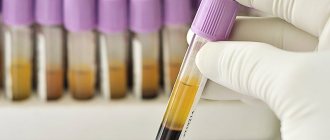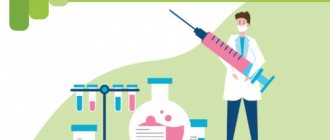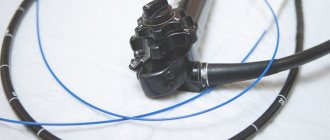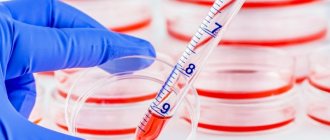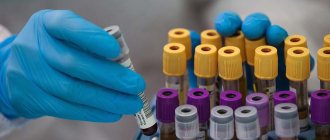Antibodies
Antibodies are the main molecular component of the humoral immune response.
They are secreted by plasma cells derived from B lymphocytes. They recognize the sequences of proteins, polysaccharides and other structures of a specific antigen, accurately connect with it by surface properties, approaching it like a key to a lock. Due to the presence of similar structures, the same type of antibodies cross-reacts to different antigens. Structurally, antibodies are Ig immunoglobulins of several classes. Immunoglobulin M IgM is the first type of antibody that is formed after encountering a new antigen. Circulating through the blood, it binds antigen and activates complement, facilitating phagocytosis. Each IgM binds many antigens, but these bonds are fragile. It does not fit the lock perfectly and is more like a rough key blank, so there are often cross-reactions with other antigens.
Immunoglobulin G IgG is the most abundant immunoglobulin in the blood, but is also found in tissues. This is the only immunoglobulin that crosses the placental barrier during pregnancy, providing immune protection to the newborn in the first months of life. Its formation in the primary immune response requires several days and active support of T-lymphocytes. This key is more polished, and the more time passes, the more ideally it fits the lock. The property of “ideal” binding to an antigen is called avidity . That is why, when met again, high-avidity IgG acts more effectively and quickly.
Immunoglobulin A IgA is present in small quantities in the blood, but works primarily in the form of secretory sIgA on the surfaces of mucous membranes and in secretions (saliva, tear fluid, colostrum).
Immunoglobulin D IgD is associated with IgM on the surface of young B lymphocytes. Its blood levels are very low and its function is unknown.
Immunoglobulin E IgE is present in the blood, on the mucous membranes of the respiratory tract and gastrointestinal tract in small quantities. It has high affinity for mast cell and basophil receptors. If antigen interacts with IgE on the surface of these cells, they degranulate. This is the release of the contents of cell granules that cause an acute allergic inflammatory reaction.
Such different antibodies
Not all vaccines are good, and not all antibodies are created equal. P.M. helps to figure this out. Chumakov, chief researcher at the Institute of Molecular Biology named after. V.A. Engelgerdt.
Is vaccination against COVID -19 necessary? Which vaccine do you prefer? How do the antibodies that are produced as a result of the disease differ from those that should appear after vaccination? Will they protect and protect you for long? This is our conversation with Pyotr Mikhailovich Chumakov, chief researcher at the V.A. Institute of Molecular Biology. Engelhardt of the Russian Academy of Sciences, corresponding member of the Russian Academy of Sciences.
– Pyotr Mikhailovich, today three vaccines against the new coronavirus infection have already been registered in our country. Which one should you choose?
– Indeed, formally we now have three vaccines registered. Although Sputnik V, of course, is significantly ahead. Firstly, because it was the first registered vaccine, and, in addition, behind the development of Sputnik there is many years of work by a team that creates such vector vaccines based on adenovirus. The choice to use it as the first choice vaccine is quite understandable. It could have been created in the most emergency mode, which is what happened.
The following can be said about the other two vaccines. EpiVacCorona – development of Novosibirsk “Vector”, peptide vaccine. This is a new type of vaccine, and there is still very little experience with its use. Their effectiveness is little known. I would say that this project is experimental. The biggest expectation was that it should not have major side effects. Therefore, if it is effective, it will be the vaccine of choice for frail elderly patients. But now I can’t say anything about this vaccine, because there is no data on its effectiveness. I just want to say that publicly available tests for antibodies and S-protein after vaccination in the experimental group show the absence of antibodies. At the same time, Vector has its own test system that allows you to monitor the formation of antibodies against these peptides, and this system shows that antibodies appear. It is not clear to me how this can be, and this issue requires clarification. Therefore, I think that this vaccine is not yet ready for mass use, and you should not count on it as a life-saving vaccine that can protect against the disease.
– What can you say about the vaccine, recently registered, which was manufactured at the scientific center for immunobiological preparations, named after your father?
– This is a traditional vaccine, which includes the production of a large amount of a pathogenic virus, which is then inactivated in a certain way. This is the so-called “killed” vaccine.
This kind of vaccine is most often used, so there is a lot of hope for this particular one, because unlike Sputnik V, which causes the formation of antibodies to only one S-protein, although the most important, but, nevertheless, only one, Such “killed” vaccines produce antibodies to all proteins of the virus. And therefore, it is possible that immunity after vaccination with CoviVac will be more durable and versatile. Although, again, today there is no available data about this vaccine. Therefore, for now, I would only recommend it as a second choice vaccine. I would wait for mass application until we become familiar with its parameters.
– Many people think that imported vaccines are a priori better than domestic ones. Is this really true or are our vaccines no worse?
– In this case, this cliché is completely inappropriate. I must say that vaccinology and virology in our country have always been at their best. The first virus was discovered in Russia by D.I. Ivanovsky. We were ahead of many countries. Of course, the amount of money invested in our science cannot be compared with what happened and is happening, for example, in America and Europe. However, our scientists are highly motivated and well trained. And we know how to win. The same Sputnik vaccine, developed at the Research Center for Epidemiology and Epidemiology named after. N.F. Gamaleya is the fruit of efforts spanning many decades. Such work began in the USSR back in the early 70s, when adenoviruses were studied, then they began to make various kinds of vectors from them. An Ebola vaccine was developed using this platform. Therefore, I believe that there is no doubt that everything here is done with high quality. The results, published in two Lancet papers, suggest the vaccine has worked.
As for foreign analogues. Indeed, we often treat with reverence everything that comes out of the West. But there are also a lot of problems there – both organizational and medical.
For example, the AstraZeneca vaccine is also a vector vaccine, made on the basis of a monkey adenovirus. This is good, because humans do not encounter the monkey virus. But, nevertheless, it now turns out that the AstraZeneca vaccine reacts poorly and does not protect well against the South African variant of the coronavirus, while Sputnik protects well. And this is one of the arguments why AstraZeneca, together with the Institute. N.F. Gamaleya is now making a hybrid vaccine, which will be used in some countries.
As for vaccines based on the mRNA platform, which have high hopes, this is also a new class of vaccines. I was initially very skeptical about this choice to develop a vaccine that should stop the pandemic as soon as possible. The RNA that is part of this vaccine degrades very easily under the influence of various factors, and it is very difficult to predict everything. For example, if the temperature regime is not very well maintained, it is not clear whether it will be effective in “field” conditions? It’s one thing when this is a trial and all its participants are anxious about following the protocol. What will happen when mass vaccination begins? There must be very powerful logistics, and refrigerators that will provide very low temperatures.
As for the vaccine itself, in principle, it showed good results during testing. But now there are very conflicting reviews about this vaccine regarding possible side effects. There are reports of severe side effects and even deaths. It is worth investigating whether these cases are actually related to the use of the vaccine. This issue certainly needs to be carefully studied.
Another doubt raised is that this vaccine uses a polyethylene glycol-based formula as a carrier, stabilizing agent. There have been reports that this formulation itself may induce the formation of antibodies that will prevent vaccines on the same platform from being used against other diseases in the future. There are also concerns that polyethylene glycol may cause additional adverse reactions in some people.
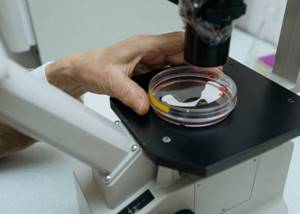
– Pyotr Mikhailovich, in Moscow there is now mass vaccination with Sputnik in shopping centers and other crowded places. we are not talking IgM and IgG antibodies People just come from the street and get vaccinated without checking. Although we know that someone could have been ill asymptomatically, and they may have high antibody titers. Do you think it’s dangerous to get vaccinated without such testing?
– In principle, there is nothing wrong with this. If we take into account the economic aspect, we must understand that these tests are quite expensive. If they are performed on everyone, the procedure will become significantly more expensive. Does this make sense from a medical point of view? There is no clear answer here either. Firstly, any test gives errors. It may be that the person has not been ill, but has a false positive result, or, conversely, the person has been ill, but the test shows nothing. Therefore, I think that in any case one should be vaccinated, even if a person has been ill, especially in a mild form.
- What if it’s heavy?
– If he was seriously ill, we should probably wait. There is currently no reliable evidence that you can become seriously ill after suffering the disease again. I think that those who have actually been ill should not get vaccinated now. Everyone else who doubts, even if they have not been tested, should be vaccinated.
– But vaccination may be useless if a person, for example, has high class G immunoglobulins. Why expose your body to unnecessary stress? Still, vaccination is not a vitamin drink.
– If you had a certain level of antibodies, and you get vaccinated, this is called a boost in immunology - a powerful addition of antigen already against the background of the fact that there was a primary response. At the same time, the level of antibodies will rise very strongly. There's nothing wrong with that. This does not pose any danger, but the protection may be longer.
— Many people are afraid of such a serious complication of vaccination as antibody-dependent enhancement of infection ( ADE ). What is this condition and how to insure yourself against it?
“Indeed, at first the possibility of ADE occurring during coronavirus infection raised concerns. The nature of this phenomenon lies in the negative effect of antibodies that are produced against viral components, but bind to it without causing inactivation of the virus. This complex of virus and antibody is absorbed by cells, for example macrophages, which normally remove foreign products from the body, but in this case they lead to the spread of the virus throughout the body and cause an increase in infection. This scenario is also possible if the quality of the viral antigen in the vaccine is poor, when antibodies are formed that do not bind strongly enough to the virus. Fortunately, we have not yet seen any confirmed cases of this kind. But, although this issue is not completely closed, this should not be a strong argument against vaccination, especially against vaccination with Sputnik, which causes antibodies in response to the intact S protein produced by the viral vector.
– The next question is important for many. People sign up for antibody testing at a regular district clinic and see the following information: in this way you can check whether you have been sick, including asymptomatic ones, or are sick now. But you cannot find out the level of antibodies resulting from vaccination. The question arises: why? Are these some kind of different antibodies?
– Of course, these are different antibodies. The fact is that the test for past illness is a test for the N-protein, which is located inside the virus, not on its surface, and antibodies to it arise when a person encounters this virus and gets sick. But if you use this test to check the formation of antibodies after vaccination with Sputnik V, it will not show you anything.
– So this class of antibodies is not produced as a result of vaccination?
- Yes, it’s not being produced. As a result of vaccination, antibodies are produced only to the S-protein, the surface spike, which, in fact, ensures the neutralization of the virus and the binding of these antibodies to the spike. In order to check how you developed antibodies specifically for vaccination, you need to go to companies that do such a test. There are such companies. For example, Helix, which offers a quantitative test that can be used to determine the amount of antibodies, that is, to see how successful the reaction to vaccination was.
– We know that antibodies are not always produced in everyone, either as a result of illness or as a result of vaccination. There are people who are immune to both vaccination and certain viruses in general. And so, let’s say a person was vaccinated, but he did not develop antibodies. What conclusion can he draw from this - that he is still not protected from the disease and he needs to take some measures or, on the contrary, he is protected and this virus does not threaten him?
– In most cases, it all depends on how much time has passed since vaccination. If, for example, a month and a half has passed since vaccination, then almost everyone will probably have a sufficient level of antibodies. Although the publication in The Lancet, published by the authors of Sputnik, shows that after the second vaccination there are people whose increase in antibody levels is not so pronounced, nevertheless, the production of antibodies is observed. I agree with the authors that this level is enough to prevent a person from becoming seriously ill. If antibody levels still remain low, I think it is worth considering a booster shot with a different vaccine.
- Exactly the other one?
– You should not be vaccinated with the same vaccine, because there are already antibodies to the adenovirus, and perhaps this vaccination will not be effective. After all, the titer of antibodies to the adenoviral vector will be very high soon after vaccination, and this may interfere with vaccination. But everyone is different, and the immune system reacts to everything differently. Some may have had concomitant diseases during vaccination that were not paid attention to, but which prevented the formation of antibodies. Of course, we must not forget about this. This also applies to frequently ill, weakened people, and elderly people whose immune system is also not up to par. Probably in this case it makes sense to find out how well the antibodies have formed.
The second aspect is if quite a long time has passed after vaccination, and the antibodies have dropped and are not even detectable. This also doesn't say much. Usually after vaccination, even after a previous illness, the level of antibodies initially rises, but then falls, but there is no need for high levels. If there had not been such a decrease, we would have had solid antibodies in our blood from all the previous encounters with antigens.
Low levels of antibodies over time do not mean that a person is not protected, because he still has memory cells that store information about these antibodies. And as soon as a person encounters the virus again, they begin to multiply very quickly and produce these antibodies. The incubation period, which always occurs during infection, is usually sufficient for the required amount of antibodies to develop during this time.
Although much is still unknown. For example, it is not clear what will happen if a person is faced with a huge dose of the virus? Will vaccination help overcome the existing antibody barrier? Maybe not. But I think, in any case, a person will suffer from a milder form of the disease.
– In what case should a person decide that perhaps it is worth trying to be vaccinated with another vaccine, since antibodies are low?
– If 45-60 days after vaccination the antibodies are still low or absent, you probably need to be vaccinated with another vaccine. Of those that I would now recommend, this is the vaccine from the center. M.P. Chumakova.
– What kind of vaccine did you choose for yourself, or are you still making do with those non-specific means of prevention that, following your wonderful parents, you continue to develop?
“I protected myself this way throughout the entire pandemic, but now I still decided to get vaccinated because I believe in Sputnik.” I know the people who worked on it well. Publications on this topic are quite convincing. That's why I got vaccinated. I haven't checked my antibody levels, although it might be worth doing. Now just about three weeks have passed since the second vaccination. I feel protected. Although this does not mean that you have to go to great lengths and communicate with the sick. I have always had a certain skepticism regarding the mask, but, nevertheless, since such an order exists, we must follow it. I don’t know whether this is effective or not, but I think it is effective to some extent, because this year, for example, there was no flu epidemic.
– Do you think there was no flu because they wore masks, and not because flu and Covid are competing viruses?
- Well, what competition is there! If, let’s say, this virus circulated widely and did not cause painful symptoms in most people, then yes, it would probably be competition. And in this case, when a person encounters a virus, in most cases he gets sick. So I don't think it's competition. Most likely, precautionary measures played a decisive role here - distance, absence of close contacts, and masks. All this has led to the fact that there is practically no flu this year.
Video title
Complement system
The complement system is a special type of molecules (proteins, enzymes and their precursors) that help in the immune response. The complement system connects innate and acquired immunity, because participates in phagocytosis, antibody production, and destruction of foreign cells.
Components of the complement system perform many functions: stimulate chemotaxis (directed movement of leukocytes towards antigens), trigger degranulation of mast cells regardless of antigen binding to IgE, help phagocytic cells bind antigens (opsonization) and much more. The components of a compliment are designated by the letter C and a number indicating the order of their opening (from C1 to C9), simply by letters (factor B, factor D) or have a name (properdin).
Compliment activation occurs under the influence of immune complexes formed by antigen-antibody bonds, or in response to large antigens and acute phase proteins.
Congenital and acquired deficiency of complement components significantly reduces the body's resistance to infectious agents.
What are antibodies and how do they appear?
Antibodies (also called immunoglobulins) are proteins produced by the immune system as a reaction to the penetration of a virus, including covid, into the body, even without pronounced symptoms of the disease. Antibodies are able to detect coronavirus, eliminate the infection and store information about it in the event of a second encounter.
In the first days of the disease, antibodies begin to be synthesized, which are the very first to encounter the virus. They are markers of primary acute infection.
To protect against viral infections, including coronavirus, the human body produces several classes of antibodies. It is important that they are produced in sufficient quantities. With strong immunity, there are enough proteins that can resist the virus. In this case, the disease will be asymptomatic and mild.
If your immune system is weak, your chance of getting infected increases. The body’s protective function does not manifest itself in full force and is not able to eliminate the infection. The risk of severe consequences and complications increases.
How long does the immunity to the virus remain in those who have recovered?
Doctors say that people with a high IgG value have a minimal risk of re-infection with coronavirus. But there is no confirmed data yet regarding the protection of antibodies from recurrent disease and how long they remain in the body. It happens that antibodies are present, but in insufficient quantities, or simply cannot resist the infection. In addition, the virus mutates quickly, which means re-infection is possible. Therefore, you should take all precautions.
According to laboratory studies, many people who have recovered from the disease develop immunoglobulins for a new infection. They appear most quickly in the child’s body.
Repeated cases of coronavirus infection have already been recorded in South Korea and China. But it is still unclear whether the person fell ill again or whether he was not completely cured the first time.
